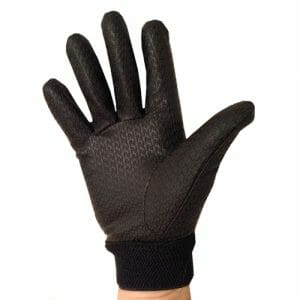April 16, 2014 by Sion "Brummie" Scone in Opinion with 164 comments
 In light of some recent rules changes in MLU, which kicked off its second season this week, here are some rules changes that I’d like to see WFDF make:
In light of some recent rules changes in MLU, which kicked off its second season this week, here are some rules changes that I’d like to see WFDF make:
1. No Gloves
Imagine you turned up to a tournament and were faced with a strong wind, strong enough to limit the range of even your best throwers to, say, 30 yards. Now imagine that one of your opponents brings onto the pitch a handheld device they have invented which reliably pings an Ultrastar 60 yards upwind. You’d probably think they had an unfair advantage.
Interestingly, there is nothing in the current WFDF Rules to prevent anyone using any equipment that assists throwing.
Of course, if such a rule was enforced, then where do you draw the line? There has been a recent trend towards playing in gloves.
Gloves provide a more consistent grip than skin alone, particularly in hot (read “sweaty”) or wet conditions. The “slippery flick” may be a thing of the past. But – surely – there is a skill in throwing with wet hands? If one player has learned that skill they surely they deserve that advantage over someone who has not? Or do we want to reward shortcuts? Does wearing gloves break SOTG by gaining an unfair advantage?
What about gloves that give an extra few inches of reach? Would you object to someone wearing “wings” that make breaking the mark difficult? What about huge shoes that allow an extra foot on your pivot? Sticky catching gloves that attract plastic and prevent the disc slipping out of your hand when you land? I’m sure there’s at least one person out there using a golf glove for their dominant throwing hand and a wide receiver glove for their other. Some of these may sound preposterous, but the line must be drawn somewhere.
Brummie’s Suggestion: Any equipment that assists a player’s ability to catch or throw should be made illegal. Keep the game pure. If you want to be able to throw a 50m bomb in the rain, or catch that slippery disc in humid conditions, get out and practice.
2. No Strips In The Air
So, you’re playing defense and someone throws up a hospital pass and a crowd gathers underneath. You come in from the side, jump early, snatch the disc and land cleanly, without initiating contact. “Strip.” It’s a tough situation because, with momentum on your side, there is very little chance that you were even aware that someone else might have had control of the disc. Likewise, if you’re the one standing still under a disc in a crowd, you rarely get a clean jump and are therefore unlikely to get a clean catch before a defender. Yet this situation results in a lot of calls that most crowds really don’t like. Since crowds are full of ultimate players, surely this is indicative of the fact that no one really likes this call in this situation? Or, in layman’s terms, “if you’re gonna stick up a prayer then don’t use wimpy calls to get the disc back.”
Since it is much harder to know if you stripped the disc than whether you fouled someone, why not just remove the grey area entirely? If someone lands with the disc without fouling, then the game should continue without stoppages.
Brummie’s Suggestion: No player should be able to call strip while in the air. So long as no player has been fouled, whomever lands with the disc in hand wins the battle. This should help to make the sport more watchable by reducing calls on jump balls.
3. No Time Outs
I’ve posted previously about tactical use of time outs. But, really, I think timeouts should be completely eliminated from the sport. Timeouts are uncommon in non-American sports. They hand a lot more power to off-field players and coaches, slow down the game, break momentum, and give teams a bailout when everything goes wrong. Why are these aspects of the game desirable? Personally, I think that the ability to think clearly and calmly, and to maintain a structured offense under duress, are the kinds of qualities that should separate the best from the rest.
If your team is reeling and you don’t know where to turn, then currently a timeout is deployed to give you chance to recover. Isn’t that a little like saying “woah woah woah, we can’t deal with your defense at all, please give us some space to breathe?” Why do we give teams the opportunity to play a “Get out of jail free” card? If you can’t stand the heat, get out of the kitchen.
Calling a timeout also makes you lose you all of your fantasy points, and they are really really really dull for anyone watching. Most of a game of ultimate is stoppages already (something like 20% of a total match is spent as active playing time), so let’s remove approximately ten minutes of dead time and return it to the hands of people who can play & think under pressure. The vast majority of timeouts result in a first pass turnover anyway. Timeouts reward teams who are less conditioned and less organized. Why would we want to do that?
Brummie’s Suggestion: Eliminating timeouts from the game completely would speed things up, and give added advantages to teams that are highly adaptable and able to make real-time adjustments.
Got a rules change you’d like to see? Drop a comment below.